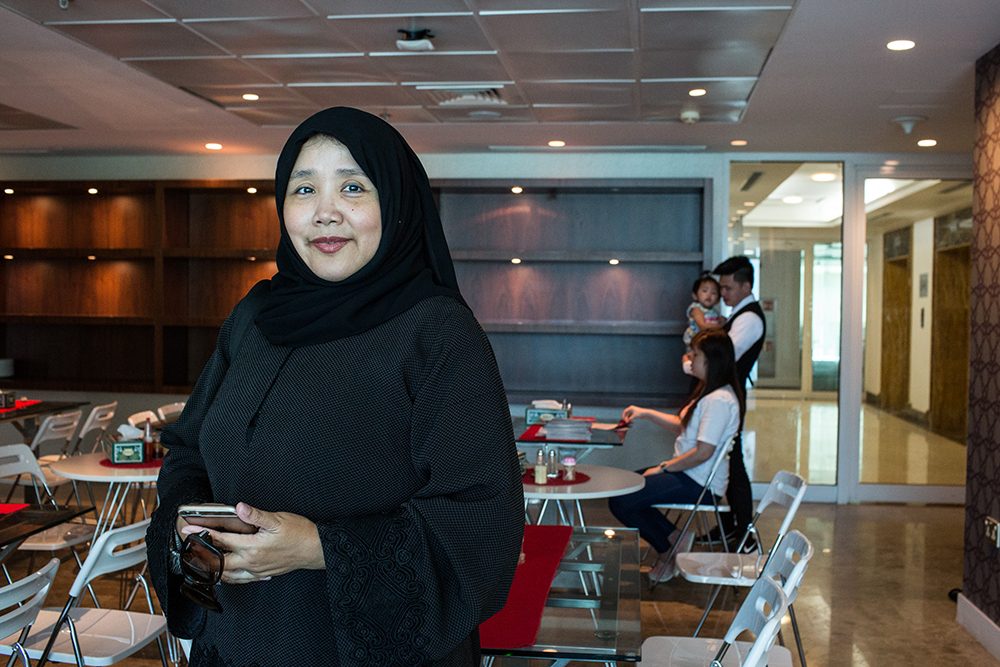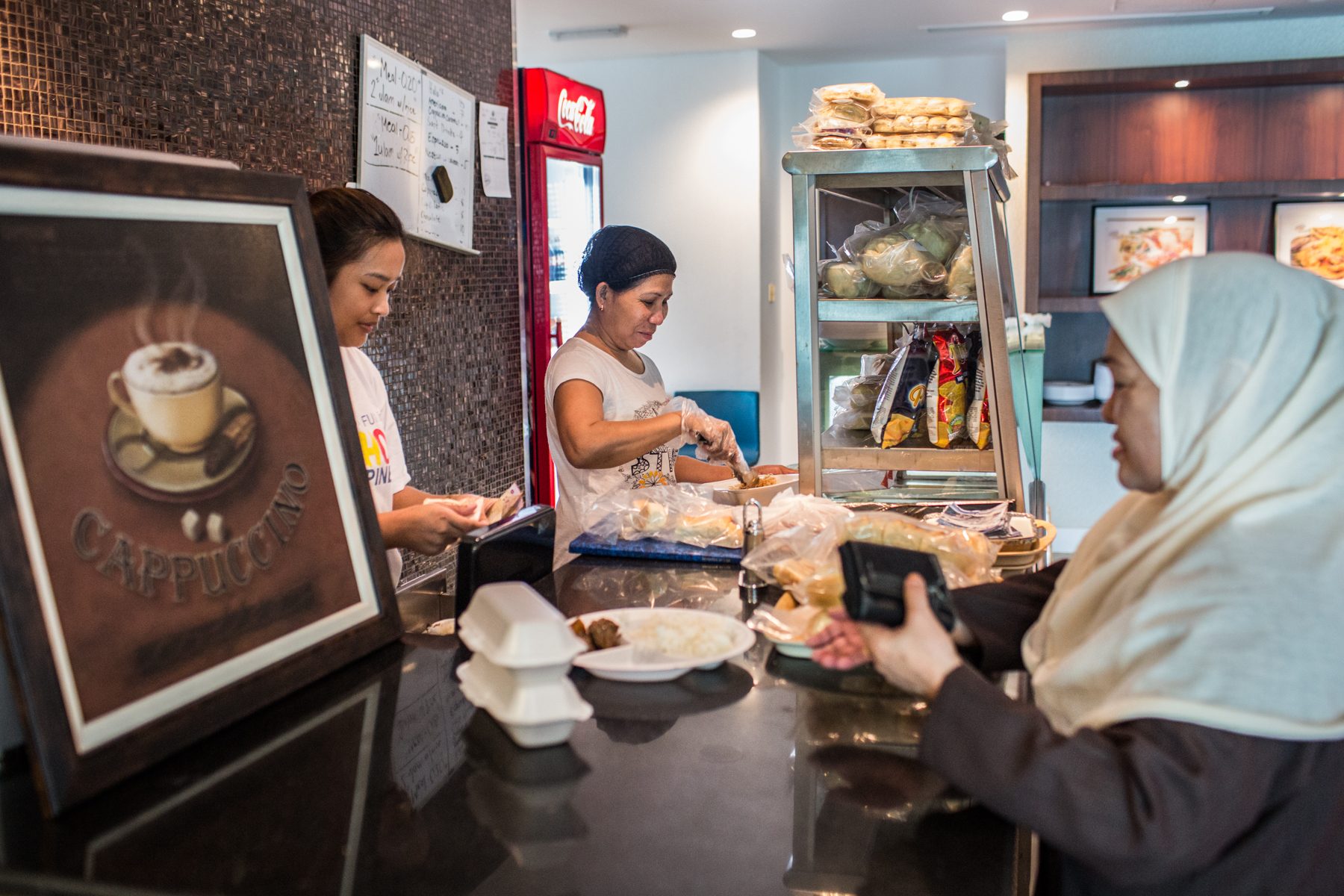SUMMARY
This is AI generated summarization, which may have errors. For context, always refer to the full article.

DOHA, Qatar – Dahlia Agbanlog had an expansive view of the dazzling West Bay district from the small round table where she sat. The long narrow skyscrapers that lined the streets seemed to twinkle under the glint of the sun. On hot arid days like this, an ice-cold halo-halo would have just been just the thing to stave off the desert heat.
“Halo-halo is one of JKCMom Cafe’s best sellers,” Agbanlog said and promptly asked her son, Christian Dahnuel, who was manning the cashier to whip out one for me so I could find out for myself.
Agbanlog opened JKCMom Cafe last summer in the Twin Towers along Al Jazeera Street, in the same building as the Philippine Overseas Labor Office Overseas Workers Welfare Administration (POLO-OWWA). Already, the cafe which is named after her children, has begun to draw a steady crowd of Filipino and non-Filipino customers.
“Our kababayans (countrymen) who come here sometimes spend an entire day lining up to get their various requirements (at the POLO-OWWA). They are going to get hungry,” said Agbanlog pragmatically.
And they are bound to look for a hearty meal of Filipino favorites like adobo and caldereta with a generous helping of rice, then perhaps indulge in a glass of halo-halo after.
The cafe is her latest project in a growing list of successful enterprises that have introduced Filipino food to Qatar, starting with the first Nayong Filipino restaurant she opened in Mesaieed in 2004. Agbanlog closed that to open another branch in Al Khor.
“I opened the Nayong Filipino restaurant in Al Khor back in 2006 when it was still a desert. People thought I was crazy to open up a restaurant there,” laughed Agbanlog.
While others saw a desert, Agbanlog saw an opportunity in the growing number of Filipino labor migrants coming to Doha to work.
The migration wave that would make Qatar the third most populated country by Filipinos had just started. Men were working as welders, plumbers, and electricians in the construction sites that had begun sprouting up around the city. Nurses began filling up the staff posts at the nearby Hamad Hospital.
Agbanlog thought, if they were like her, it would take them awhile to get used to Arabic food. “They’re going to get hungry and look for Filipino food.”
Having lived in Doha since 2001, Agbanlog knew that in a foreign country where you are far away from everything that is familiar, the taste of a Filipino dish would satisfy your longing for home. Culturally, food is so important to the Filipino way of life. Eating is not just about satiating hunger; it’s about community gathering.
She admitted that it was a hunch, but she was willing to gamble on it. Agbanlog started with 3 employees: her brother was the chef, her father was the cashier, and another relative was the dishwasher.
On the first day they opened, snaking lines formed from the cashier and spilled over into the streets. The restaurant was an instant hit and a source of validation.
Her very first food business venture years before was short-lived though, because some business partnerships took a downturn. That was Agbanlog’s first taste of failure and it hurt. “It was hard for me to think about setting up another business. It was hard for me to trust again because it might be taken away.”
But the fighter in her told her she shouldn’t give up. Her initial success proved that a Filipino restaurant in Doha had a market. “I just thought of another concept for a Filipino restaurant and started all over again.”
That was the birth of Nayong Filipino, a restaurant best known for serving a mix of Filipino, Chinese, and Singaporean food.
Now Nayong Filipino has expanded its services to supplying different kinds of Filipino breads to over 100 shops around Doha. “The monays and siopaos that you see being sold in the stores around Doha, we probably supplied that.”
From a restaurant with 3 family members as employees, Agbanlog now employs 45 people. Majority of them are Filipinos and some still are relatives, but she now also employs some foreigners. “I thought instead of sending them (relatives) money back home, I could just bring them here and work.”
Not too bad for someone who came to Doha in 2001 from Mangaldan, Pangasinan – her first time out of the country to visit her brother – and who ended up never leaving.
“I never imagined that things would turn out this way. I wanted to be a doctor and my first job was selling Tupperware!” laughed Agbanlog.
To this day, Agbanlog can still deliver the Tupperware sales pitch of “a locked-in airtight seal that comes with a lifetime service guarantee” with much confidence. “I believed so much in the product. I could fight for it, defend it and share many positive experiences about it. It wasn’t sales talk anymore.”
Sales was in Agbanlog’s blood and her top sales ranking and commissions proved it.
“My first big sales commission was P7,000. Back in the early 90s, that was already a lot of money,” she said, then added with a laugh. “Well, I’m sure there was some charity there, too. People must have been thinking, ‘She’s so young and hardworking. I’ll buy from her.’”
Agbanlog’s days in direct selling served as business school bootcamp where she trained in the persuasion needed for sales, learned the charisma that is at the heart of people skills, and mastered the numerical dynamics of profitability.

Lessons learned
Looking back on it all, the 45-year-old Agbanlog says that the dream of becoming your own boss does not come easy. Anyone considering entrepreneurship should know that it requires a lot of hard work and means having to know a little bit of the entire business cycle from operations to human resources to marketing.
“I would say that you just have to stay curious and enjoy the learning process. Everything can be learned. Everything can be turned into an opportunity,” said Agbanlog.
The current global buzz on Filipino food is another untapped opportunity to expand her horizons beyond Doha. Now she’s setting her sights on setting up a Filipino restaurant in Georgia. “I vacationed there and fell in love with the country and its weather.”
Her brother, her trusted chef, is already there making the initial preparations.
There aren’t a lot of Filipinos living there yet but she’s seen many of them traveling to Georgia on holiday. “I’m sure they’re going to look for Filipino food. When you travel, after you’ve tasted the local cuisine you end up looking for a taste of home.”
“And I’m sure the Georgians are going to love our adobo,” quipped Agbanlog, her eyes twinkling at the prospect of another new business adventure. – Rappler.com
Reporting for this project was supported by the Pulitzer Center on Crisis Reporting
Add a comment
How does this make you feel?
There are no comments yet. Add your comment to start the conversation.